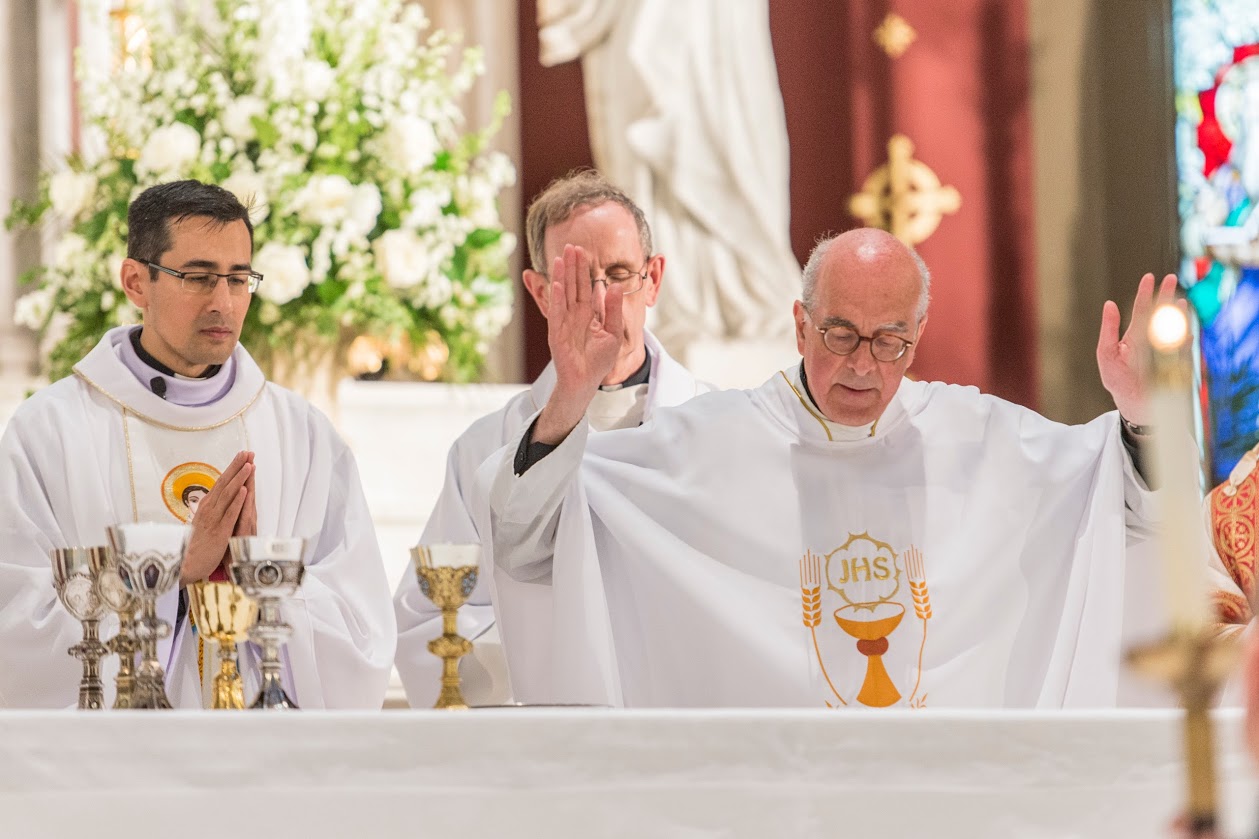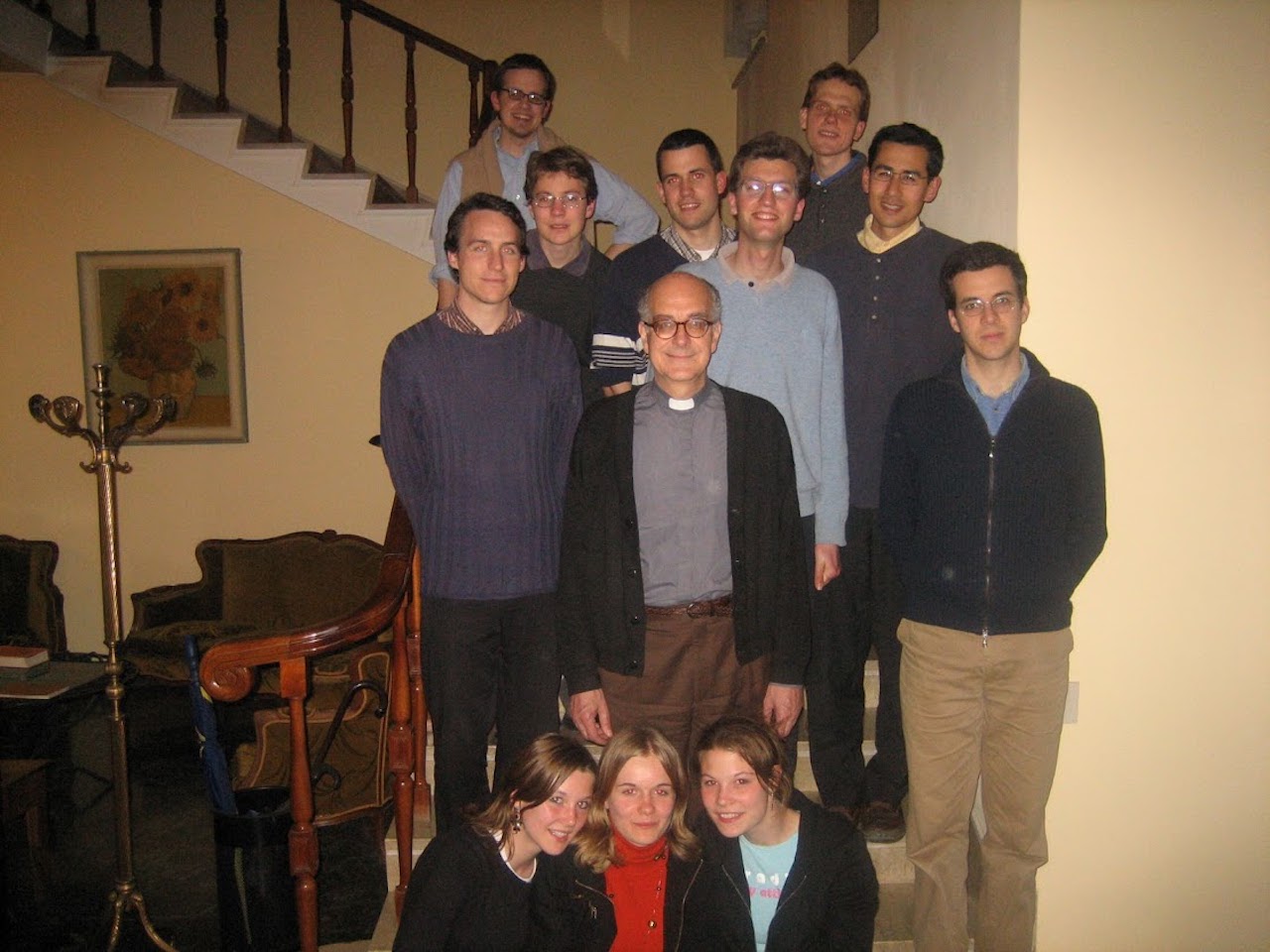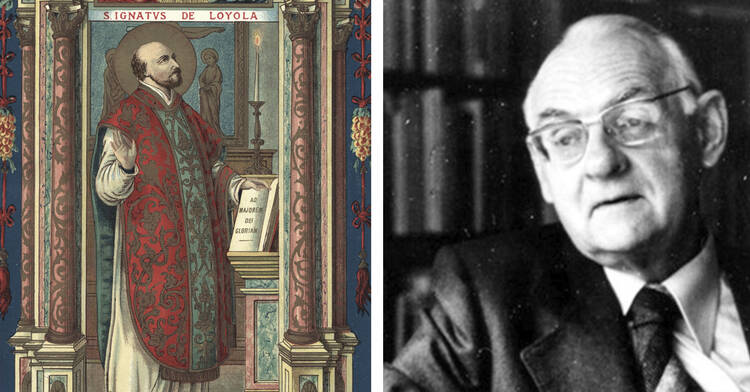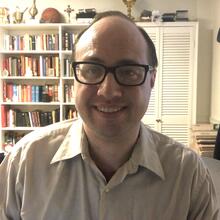Jacques Servais, S.J., is a Belgian theologian who taught systematic spiritual theology at the Gregorian University and has directed the Casa Balthasar, a school of discernment and formation for young lay Christians, since its foundation in Rome in 1990.He also serves as president of the Lubac-Balthasar-Speyr Association, established by disciples of Henri de Lubac, the Swiss theologian Hans Urs von Balthasar and the spiritual writer Adrienne von Speyr under the patronage of Cardinal Joseph Ratzinger. Arguably the world’s leading authority on the Ignatian spirituality of Balthasar, he has published various works and articles on the spiritual sources of his thought—in particular St. Ignatius of Loyola, Adrienne von Speyr, John Henry Newman and Maurice Blondel.
Recently, Father Servais finished editing a new anthology of von Balthasar’s writings on the Spiritual Exercises of St. Ignatius as an aid to people making or giving them, released in the U.S. under the English-language title Hans Urs von Balthasar on the Ignatian Spiritual Exercises: An Anthology. On May 20, I interviewed him by email.
Although Hans Urs von Balthasar has enjoyed a resurgence in academic circles, many ordinary Christians and even Catholics going on retreat might not know his name. Who was Balthasar and why should non-theologians care about his writings?
For almost 10 years, Balthasar was a campus minister, and until his death in 1988, he remained director of the publishing house Johannes Verlag, which he founded, and editor of a “bibliotheca”curated to help Christians living and acting in the secular world. He did not consider his theological writings to be his most important work. In fact, his doctoral thesis was in German literature. He distrusted the rationalist approach to knowledge taken up by the theology of his time. His way of handling the subject of theology—the triune God and his revelation to mankind—was more in line with Bonaventure or Pascal. One could perhaps characterize his standpoint in the words of the poet Petrarch to Giovanni Colonna: “Philosophy must become for us nothing but the love of wisdom; God’s wisdom, however, is his logos—it is Christ; and thus, we must love him in order to become true philosophers.”
Both Henri de Lubac and Karl Rahner considered Balthasar a genius, but his genius was more that of a musician, composing, disposing and ordering.
Even in theological circles, people often feel surprised to learn that Balthasar spent 21 years as a Jesuit, leaving the Society of Jesus in 1950 only because his work to co-found a secular institute with the lay mystic Adrienne von Speyr diverged from the order’s priorities. In what ways did Balthasar remain a “Jesuit at heart” and great friend of the Society throughout the last 38 years of his life?
Balthasar was convinced that the Society of Jesus in our day has received the mission to spread the Ignatian heritage to a secularized modern society and that in order to fulfill this mission, there is a need for a new, complementary fellowship of lay men and women capable of penetrating into the world like leaven in dough. He envisioned a community of Christians living under vows and acting not so much with the traditional apostolic methods (which seem to become more and more ineffective in our age), but with a discreet presence of love, within a worldly profession.

This vision required him to revisit the Ignatian Exercises’ “Call of the Eternal King”—so decisive for traditional, far-off missions, such as that of Francis Xavier—and interpret it in light of a more explicit theology of the cross. In his book The Moment of Christian Witness, Balthasar proposes a criterion clearly measured against the Gospel: “to attempt to shape one’s life into a loving response to the crucified trinitarian love of God and thus to place oneself at the disposal of Jesus’ work of establishing God’s kingdom of love among men.” Ignatius wanted the Jesuits to follow this counsel in all its radicality. But when a Jesuit can no longer personally hold a secular position among his most agnostic contemporaries, this becomes a place a consecrated lay person may occupy — a place of hope for a new kind of fruitfulness, probably more tied with the mystery of Holy Saturday than with Jesus’ public ministry. In Balthasar’s eyes, the Jesuit priest would then be one who kindles among lay people Ignatian missions that ultimately have complete independence from the society, in accordance with the true autonomy of a fully lay vocation.
We tend to classify Balthasar as a “mystical theologian,” even describing him as a 20th century Bonaventure who complemented the Canadian Jesuit theologian Bernard Lonergan as a sort of 20th century Aquinas. In what ways does the phrase “mystical theologian” describe Balthasar?
Balthasar was certainly not a speculative thinker like Lonergan. He never became a professor or taught in a university faculty. He did teach some short courses sponsored by Catholic groups at Swiss universities and other educational forums, and young German-speaking men interested in cultural education and spiritual life often sought his wisdom and counsel. His attention was not set on systematic theology. Both Henri de Lubac and Karl Rahner considered Balthasar a genius, but his genius was more that of a musician, composing, disposing and ordering. In this regard he was more similar to another Jesuit theologian, Erich Przywara, his great German mentor, a musician and poet who was very close to the spirituality of the Carmelites.

Adrienne von Speyr played a central role in Balthasar’s life and mission, but I would hesitate to speak simply of Christian “mysticism.” We cannot deny that Adrienne, like Teresa of Avila, had extraordinary experiences right there in Balthasar’s presence—experiences that truly do deserve the adjective “mystical.” But he considered them as they should be: a grace given through her to the people of God, in order that they might thereby better live in a vital and hope-filled faith and obey more closely the promptings of the Holy Spirit. Indeed, Balthasar freely used von Speyr’s insights in unfolding a theory of theological knowledge (his Trilogy), which he applied not only to Scripture and Tradition, but also to the broad world of ancient and modern culture.
How has Balthasar’s reputation among Catholics evolved since he died in 1988, a few days before the ceremony where Pope John Paul II planned to give him the cardinal’s red hat?
He was very reluctant to accept an honor Ignatius wanted Jesuits to refuse. Yet he saw in the pope’s gesture an attempt to let his and Adrienne von Speyr’s work be received in the church. After finally conceding, he had to endure, both in his own country and in Germany, all kinds of insults from people afflicted with what he called “a deep-seated anti-Roman attitude within the Catholic Church.” Providentially, he was able to die as the poor priest he wanted to be, testifying to the true, ever-greater glory of God.
Providentially, he was able to die as the poor priest he wanted to be, testifying to the true, ever-greater glory of God.
You have pitched this book toward people who make and give retreats based on the Spiritual Exercises, the masterwork of our Jesuit founder St. Ignatius that guides people through a mystical retreat experience in various forms. What specific contribution do you see Balthasar making in this book to Ignatian retreat directors and retreatants?
I would stress the underlying Johannine dimension that Balthasar emphasizes when describing the most fruitful attitude for approaching the Exercises, whether one is giving or making them. He interprets the Ignatian way as a method for entering into friendship with the Lord, like the beloved disciple, and for gaining an understanding of God’s will by following in his footsteps. This comes out clearly where Ignatius gives meditations on the life of Jesus from scenes in the Gospel. This anthology’s choice of excerpts offers—or aims to offer—a running gloss on the classic Ignatian text. Ideally, the book will not only be a service to [spiritual] directees and directors but lead any interested reader to a vivid understanding of Ignatius’s charism and to the main theological insights of the Swiss theologian, who clearly appears here as a disciple of the saint.
Pope Francis has asked his fellow Jesuits to share the gift of Ignatian discernment with the whole church, a ministry you practice as director of the Casa Balthasar, a house of discernment in Rome for young people from around the world. Based on your work there, what can you say about the challenges young people face today and how Ignatian-Balthasarian tools can help them, contributing to the apprenticeship in discernment Francis asks our society to foster?
Balthasar’s book-length interview Test Everything: Hold Fast to What Is Good was addressed primarily to young men and women like those I am responsible for at the Casa Balthasar. Having spent a good deal of time with Balthasar, I was able to learn the skill of discernment from him personally, which revolves primarily around the dramatics of the battle that has been going on from the earliest years of Christian history (“Meditation on the Two Standards”). The Spiritual Exercises are valuable not primarily for their content, but for their method; not so much for what they give directly, as for what they are able to help produce in man through God’s grace and man’s openness.
Nobody can lead an apprenticeship in discernment without first being formed in the practice of the rules himself.
It is hard for young people today to make an immutable election, be it for marriage, priesthood or consecrated life. The temptation is to remain in the abstract sphere of intelligence or of bare will. A concrete step eludes them. The truest, best way to proceed is to discern and desire God’s own concrete, singular plan for us: ut voluntas Dei apud me fiat integer. Balthasar, like Blondel before him, highlighted this central aspect of the Ignatian method: the search for consonance between God’s utterly free offer of a mission and man’s utterly free acceptance of it. However, the Exercises also remind us that we are engaged in the human and divine tradition that has brought us to the point where we are. We learn to discern not on our own, but from others, and nobody can lead an apprenticeship in discernment without first being formed in the practice of the rules himself. In this regard, Pope Francis indeed challenges Jesuits to provide a better personal education. This is in fact the most essential presupposition for a revival of active faith among young people.
In his writings on the Exercises, what does Balthasar contribute to our understanding of prayer?
To my eyes, his main contribution is in leading us toward the right interior attitude, without which prayer easily remains superficial. He oftentimes uses a German expression, “Bereitschaft,” which translates to “readiness” but in fact means much more. Searching some older English dictionaries, an American alumnus of the Casa Balthasar discovered the word “disponibility,” which has since fallen into disuse. It comes from “to dispose” and corresponds with Ignatius’ own sense of the verb “disponer,” a putting oneself at disposal. This concept points us to the heart of von Balthasar’s and von Speyr’s understanding of Ignatian “indifference”: the willingness to be drawn in any direction for the greater praise, reverence and service of God.
Disponibility is what characterizes the Christian who allows himself to be formed however God wishes. One could compare disponibility to the attitude of a ballroom dancer moving in perfect rhythm with another who leads. The body remains poised and ready to move in any direction, following the slightest indications from the lead. In a theological sense, God always takes the lead in his dealings with us. Our call is to be disponible, utterly flexible, ready to move in whatever direction God chooses. This notion is likely the antidote to modern culture's emphasis on self-assertion and self-fulfillment. It fleshes out Jesus’ central teaching that to find oneself, one must lose oneself in love—which is the core of true Christian prayer!









